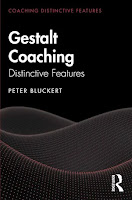As I continue to explore my interest in Gestalt approaches to coaching (see previous posts, passim) I am reading Peter Bluckert's book on the subject. I had high expectations, as the last book of his that I read was very good (see my reflections here).
And I am not disappointed. Bluckert writes clearly and concisely, with authority and wisdom. But I was brought up short by this sentence: People are always doing the best they can from how they see, experience and make sense of the world, and taking into consideration their personal histories. Bluckert describes this as a 'Core proposition' of Gestalt.
The trouble is, I don't subscribe to it. Without even going to the extreme examples of the various evil dictators and despots who caused such carnage in the twentieth century, or of the self-interested and power-hungry politicos of our own time, I don't subscribe to it. Because I look into my own heart, and as St Paul observed 2,000 years ago "the good that I would - I do not: but the evil which I would not - that I do." Or, as Solzhenitsyn, another wise observer of humanity put it: "The line separating good and evil passes ... right through every human heart."
Indeed, the proposition, as Bluckert states it, removes any moral agency from us. If whatever I do is the best that I can, then I am an automoton, not a human agent.
I do understand where he is coming from, and why that assumption is a useful starting point for any productive coaching with people who wish to change. It's the word 'always' that made me stop and revolt. Perhaps I am too literal; or perhaps it is because I really do believe in absolutes that I take absolute claims very seriously and investigate them carefully.
So I would treat this core proposition as a useful fiction as discussed on my Shifting Stories blog: it may not always be true, but it is a good assumption to start with, at least. And that much is fairly self-evident.
My late granny, who was a vibrant character, took the other starting point. She seemed to assume that anyone who disagreed with her was either mad or bad or (most probably) both. It made for an interesting life, of course, but was not, perhaps, the most peaceful or the most productive way to relate to others. And we see the same in the polarising conversations that characterise the so-called culture wars: the assumption that anyone who is not whole-heartedly one of us is both malicious and deluded. And that doesn't play out too well, either.
But as those who have worked with me may remember, I am often on the look out for false binaries. So whilst rejecting my granny's outlook, I think I can find a more nuanced place that Bluckert's counter-proposition.
Which leaves me with an interesting question. Is it legitimate for me to use an approach, such as Gestalt, when I dispute one of its core propositions? And that legitimacy question is perhaps two questions: is it intellectually legitimate, and is it morally legitimate?
I think so, on both counts. Intellectually, I have two lines of defence. One is that using any approach does not necessarily mean that one subscribes to every claim that it makes; and if anyone is interested, I am happy to explain my useful fiction concept.
But also, I have a theory that with Gestalt, as with many other approaches, the useful practices were discovered experientially as much as anything, and the philosophy and intellectual framework was built either concurrently or subsequently. Further, I think that some of that theorising is often mistaken. For example, Carl Rogers was clearly an incredibly gifted and skilled practitioner; but it is noteworthy that those whom he trained in what he thought he did that worked were rarely anything like as accomplished. So I suspect his theory of what he thought he did that worked was, at best, partial.
The moral question is in part answered by my intellectual answer; but there is a further dimension: do I risk doing (or implicitly teaching) anything harmful by working with an approach whose philosophy I don't subscribe to? And here I think that my more nuanced approach is less likely to be harmful than the approach Bluckert advocates. If one is coaching someone whose boss is, for example, very political, somewhat narcissistic, and manipulative, how well does one serve the individual by encouraging her to base her plans and approach on the belief that he will always do the best that he can...? And as far as implicitly teaching an absolute that is not universally true is concerned, again, I think being explicit in my assumption that it is a useful fiction is a morally sound stance.
Having said all of which, I still highly recommend Bluckert's book, as very readable, practical and thought-provoking. But as with any book, don't swallow the ideas whole...













